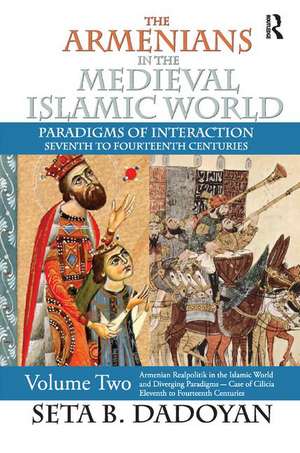The Armenians in the Medieval Islamic World: Armenian Realpolitik in the Islamic World and Diverging Paradigmscase of Cilicia Eleventh to Fourteenth Centuries
Autor Seta B. Dadoyanen Limba Engleză Paperback – 28 sep 2017
Dadoyan's premise is that if Armenians and Armenia have always been located in the Middle East and the Islamic world, then their history is also a natural part of that region and its peoples. She observes that the Armenian experience has been too complicated to be defined by simplistic constructs centered on the idea of a heroic, yet victimized nation. She notes that a certain politics of historical writing, supported by a culture of authority, has focused sharply on episodes and, in particular, on the genocide.
For her sources, Dadoyan has used all available and relevant (primary and secondary) Armenian sources, as well as primary Arab texts and sources. This book will stimulate re-evaluation of the period, and re-conceptualizing Armenian and Middle Eastern histories.
| Toate formatele și edițiile | Preț | Express |
|---|---|---|
| Paperback (3) | 324.16 lei 6-8 săpt. | |
| Taylor & Francis – 28 sep 2017 | 324.16 lei 6-8 săpt. | |
| Taylor & Francis – 28 sep 2017 | 325.34 lei 6-8 săpt. | |
| Taylor & Francis – 28 sep 2017 | 325.34 lei 6-8 săpt. |
Preț: 325.34 lei
Preț vechi: 371.71 lei
-12% Nou
Puncte Express: 488
Preț estimativ în valută:
62.26€ • 64.51$ • 51.96£
62.26€ • 64.51$ • 51.96£
Carte tipărită la comandă
Livrare economică 22 martie-05 aprilie
Preluare comenzi: 021 569.72.76
Specificații
ISBN-13: 9781138515406
ISBN-10: 113851540X
Pagini: 347
Dimensiuni: 152 x 229 x 31 mm
Greutate: 0.45 kg
Ediția:1
Editura: Taylor & Francis
Colecția Routledge
Locul publicării:Oxford, United Kingdom
ISBN-10: 113851540X
Pagini: 347
Dimensiuni: 152 x 229 x 31 mm
Greutate: 0.45 kg
Ediția:1
Editura: Taylor & Francis
Colecția Routledge
Locul publicării:Oxford, United Kingdom
Cuprins
Introduction I. Th e Armenian Intermezzo: Argument for the Classification of the Period as a Unique Phase II. Emigrations and Settlements in al-Sh?m in the Ninth and Tenth Centuries III. Greeks, Christians, Armenians, Ism?‘?l?s, ?amd?nids, F??imids, Kalb?s, and Kil?b?s in al-Sh?m during the Ninth and Tenth Centuries IV. Th e Ghuzz/Turkmens and Seljuks in Asia Minor, Armenia, and al-Sh?m 2 Armenian–Byzantine and Armenian-Islamic Realpolitik and Peripheral Principalities I. Armenian–Byzantine Realpolitik and Peripheral Principalities, Eleventh to Twelfth Centuries Th e Armenians in the Medieval Islamic World II. Th e T‘ondrakian–Ism?‘?l? Connection—Gorg, ?azar, and T‘oros as Missing Link “Brigands” and the Rise of a Heterodox Ruling Class on the Frontiers III. Armenian–Muslim Realpolitik: Muslim–Armenian Powers I. Th e Armenians in Egypt II. Th e Involvement of the Pro-Byzantine Armenian Institutions in Egypt III. Muslim Armenian Vizierial Rule, 1074–1163 IV. Th e Testimony of Architecture I. Th e Dynastic Triangle or the Second Age of Kingdoms II. Th e Mongols: Penetration and Politics III. Cilicia Paradigm Case between the East and the West IV. Th e Kingdom and the Church between Latins, Byzantines, Ayy?bids, Mongols, and Maml?ks I. Beginnings in the Eleventh Century in the North: Narekac‘i, Magistros, and Imastas?r II. Th e Silver Age in a New World: Theology, Philosophy, and Arts III. Church Union and the Predicament of the Cilicians—the Literature IV. Th e Theological–Philosophical Legacy of the Twelfth Century V. New Th inkers: Society, Philosophy, and Science—Aygekc‘i, Rabuni, and Herac‘i VI. New Science VII. New Philosophy: Armenian “Nominalism” VIII. Cilician Aesthetics and New Arts: Poetry and Painting Summary: Th e Arguments in Volume Two
Descriere
In the second of a three-volume work, Seta B. Dadoyan explores the Armenian condition from the 970s to the end of the fourteenth century. This period marked the gradual loss of semi-autonomy on the traditional mainland and the rise of Armenian power of diverging patterns in southeastern Asia Minor, north Syria, Cilicia, and Egypt
